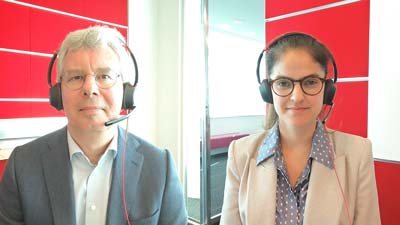Anastasia Georgiou: Hello, I'm Ana Georgiou at Morningstar UK, and I'm here with Heather Hopkins, Founder of NextWealth and we're going to be talking about why investors pay for advice.
Hi, Heather.
Heather Hopkins: Hi.
Georgiou: So, you do a lot of research with advisers, can you talk about why it is investors are paying for advice and the benefits of that?
Hopkins: Yeah, it's a really good question. So, we just did a piece of research with the investors on this recently because there is new disclosures that are coming out for cost and charges from the platforms, asset management and financial advisers and a lot of people are wondering how people will react to this. So, we thought, well, let's ask investors, why they pay for financial advice? What's the reasons, what's the driver? And what we heard was that they want access to better potential investor returns and they want peace of mind. Those were the two top things that come out.
And I don't think that would come as a surprise to anyone, but sometimes I think financial advisers think it's about the administration, it's about accessing markets, it's about understanding how to structure a plan. I think that all comes downs to it, but it's really those drivers of – I'm not very – I don't have the big risk appetite, I don't want to risk losing my money and if I work for – with the professional, maybe they can help me think about how to get a bit more than getting in the bank, but without that downside.
Georgiou: Do you think there is a concern from the advisers' side that the sort of disclosure of the breakdown of costs that's coming from sort of MiFID II is something that might scare the investor off?
Hopkins: Absolutely. So, there has been a number of different steps towards this disclosure of charges and fees. And the first one was advice charges a few years ago with the retail distribution review and there was a lot of people who expected that that would be this moment where people would say, I'm not paying that, I had no idea I was going to pay that and they would do it themselves. But we haven't seen that shift. But now we have this next phase, where not only the financial advice charges would be disclosed, but all of the asset management platform, everything. And as a single amount with a forecast of the impact that has in the portfolio and I think people are wondering what impact they will have on people's appetite to pay for advice and for all of these other bits, because it's not just the adviser charge.
So far what I'm hearing from advisers is that their customers are comfortable with the advice charge because they knew that, but it's the other charges that they didn't, they weren't necessarily as aware of and so they are looking at that aggregate fee to wonder how they could bring that down and that could be through a lower cost advice proposition or it could be lower cost investment options, but it's – you know the cost is we're talking about 2% probably total. So, it can seem high as a pound and pence figure, but it's not a huge proportion of the portfolio. But it's that figure when you see it in pounds and pence can seem quite large.
Georgiou: Do you think this might have sort of further impact on platform fees like a further squeeze?
Hopkins: Yeah, absolutely, so your platforms have – so they're the lowest margin piece of the supply chain and the lowest cost piece of the supply chain, but they get squeezed because they're not seeing as adding value, they are seeing as custody and administration. So, absolutely, that will be squeezed. But it's really interesting, in the survey we did with customers we asked them what they thought they were paying and it's much lower than the actual charges.
And then when we asked them about their level of confidence about what they were paying, it was also – they weren't that confident. So they sort of put out a number, but they wouldn't know exactly. And I don't think that respects any naivety. Because if you ask me what I pay my accountant, well, I can guess, but I don't know an exact figure. So, I don't criticise customers for that sort of impression. But I think when they see that cost, it might create a bit of a shock and the platform will be the first to be squeezed absolutely.
Georgiou: Thank you so much, Heather.
Hopkins: Thanks, Ana.
Georgiou: Thank you for listening from Morningstar U.K.
This article is part of Morningstar's special report on What the Experts Say





























